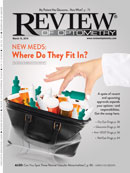Researchers in the United Kingdom (UK) recently unveiled an artificial intelligence (AI) system that can correctly refer more than 50 retinal conditions in more than 94% of cases—stats that match or even exceed experts in the field.1
The collaboration between Moorfields Eye Hospital NHS Foundation Trust, UK-based Google DeepMind, University College London and Southampton University published their findings in Nature Medicine August 13th, making waves in the eye care community.2
Because the volume and complexity of diagnostic imaging is exploding beyond what experts can manage, the team sought an AI solution to ensure patients in need are seen in a timely manner. Their program, build on a deep learning architecture, analyzed 14,884 three-dimensional optical coherence tomography (OCT) scans as training—and then proceeded to provide referral recommendations on a range of sight-threatening retinal diseases. After experts analyzed the same OCT scans and made their own referral decisions, they found the program showed a 94% accuracy rate.
The system’s ability to train properly with so few scans removes a major barrier to implementation, according to the researchers: it doesn’t need “prohibitive training data requirements across multiple pathologies.” But that’s not the only barrier this system destroys. The deep learning architecture it’s based on uses OCT tissue segmentations that act as device-independent representations, meaning “referral accuracy is maintained when using tissue segmentations from a different type of device,” the study says.2
With these stumbling blocks out of the way, the team plans to move forward with clinical trials, in the hopes of launching the system in as many as 30 UK hospitals within three years.1
1. Matthews S. Eye care revolution: AI programme with 94% accuracy can now spot diseases that cause blindness (and it's as good as the world's top consultants). Daily Mail. www.dailymail.co.uk/health/article-6056259/AI-programme-spot-diseases-worlds-consultants.html. August 13, 2018. Accessed August 14, 2018. 2. De Fauw J, Ledsam JR, Romera-Paredes B, et al. Clinically applicable deep learning for diagnosis and referral in retinal disease. Nature Medicine. August 13, 2018. [Epub]. |

